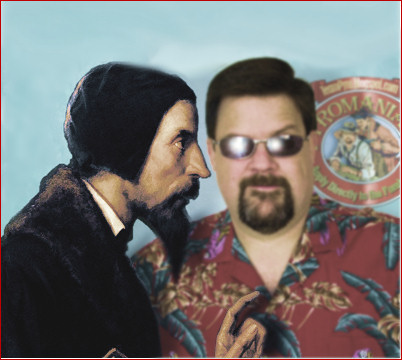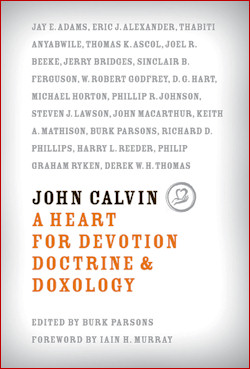The following is excerpted from a chapter I contributed to John Calvin: A Heart for Devotion, Doctrine & Doxology. The book commemorates Calvin's 500th birthday.

 ohn Calvin excelled in every ministerial duty he ever set his hand to. He stood out in his own generation for the sheer power of his preaching and his amazing command of Scripture. His skill as an exegete and biblical commentator surpassed anyone the church had ever seen. His proficiency as a teacher of theology was likewise superior to all who came before him. His influence as a discipler of young men bore fruit that is still multiplying today. His competence as a church leader, his forcefulness as an apologist for the truth, and his remarkable ability to educate and motivate others were all highly renowned. In the words of William Cunningham, "Calvin was by far the greatest of the Reformers with respect to the talents he possessed, the influence he exerted, and the services he rendered in the establishment and diffusion of important truth."
ohn Calvin excelled in every ministerial duty he ever set his hand to. He stood out in his own generation for the sheer power of his preaching and his amazing command of Scripture. His skill as an exegete and biblical commentator surpassed anyone the church had ever seen. His proficiency as a teacher of theology was likewise superior to all who came before him. His influence as a discipler of young men bore fruit that is still multiplying today. His competence as a church leader, his forcefulness as an apologist for the truth, and his remarkable ability to educate and motivate others were all highly renowned. In the words of William Cunningham, "Calvin was by far the greatest of the Reformers with respect to the talents he possessed, the influence he exerted, and the services he rendered in the establishment and diffusion of important truth." But of all Calvin's extraordinary gifts, his aptitude as a writer is the one that most amplified all the others and secured Calvin's position in history. Calvin was a prolific, almost obsessive, writer. Practically everything he ever did by way of teaching, preaching, or debate was set down in writing and subsequently published—his sermons, his commentaries, his views on theology, his polemical exchanges over disputed points of doctrine and practice, and a large volume of his personal correspondence. No other mind in that generation is quite so well documented, and it is thanks largely to Calvin's own industriousness as a writer that we have that invaluable record.
But of all Calvin's extraordinary gifts, his aptitude as a writer is the one that most amplified all the others and secured Calvin's position in history. Calvin was a prolific, almost obsessive, writer. Practically everything he ever did by way of teaching, preaching, or debate was set down in writing and subsequently published—his sermons, his commentaries, his views on theology, his polemical exchanges over disputed points of doctrine and practice, and a large volume of his personal correspondence. No other mind in that generation is quite so well documented, and it is thanks largely to Calvin's own industriousness as a writer that we have that invaluable record.It is a remarkable fact that the first major theological work Calvin ever published was the book that would become the centerpiece of his vast literary legacy—the most important, best known, and most influential of all his books. He titled it Institutes of the Christian Religion. Its first edition was published in 1536, when Calvin was only 27 years old.
[Calvin's actual first published work (in 1532) was an edition of Seneca's De Clementia with Calvin's own commentary on Seneca's philosophy. That was a basically secular treatise. Calvin's first religious work, titled Psychopannychia, was a refutation of the doctrine of soul sleep, which some early Anabaptists were promoting in France at the time. Psychopannychia was written in 1534 but not published until 1542, four years after the first edition of the Institutes.]
The Institutes became a huge success right away, earning Calvin immediate respect and name recognition among Protestants in France and Switzerland—and beyond. Over the course of the next few decades, the work became an important doctrinal compass for the whole Protestant movement worldwide. No doubt the widespread success and lasting influence of that volume impressed Calvin with the value of publishing his ideas, because from that point on, he never stopped writing.
 Calvin's collected works fill fifty-nine large volumes in the Corpus Reformatorum, a 101-volume set of crucial Reformation-era works. [Karl Gottlieb Bretschneider, et al., eds., Corpus Reformatorum, 101 vols. (Halle: Schwetske, 1863-1900). The Calvin works comprise Series 2 of that massive collection, Ioannis Calvini, Opera Quae Supersunt Omnia, vols. 29-87.] But as Robert Reymond points out, "even these do not exhaust Calvin's total literary output; twelve more volumes under the title Supplementa Calviniana . . . are available."
Calvin's collected works fill fifty-nine large volumes in the Corpus Reformatorum, a 101-volume set of crucial Reformation-era works. [Karl Gottlieb Bretschneider, et al., eds., Corpus Reformatorum, 101 vols. (Halle: Schwetske, 1863-1900). The Calvin works comprise Series 2 of that massive collection, Ioannis Calvini, Opera Quae Supersunt Omnia, vols. 29-87.] But as Robert Reymond points out, "even these do not exhaust Calvin's total literary output; twelve more volumes under the title Supplementa Calviniana . . . are available."Calvin was not Protestant Christianity's most prolific author. That honor would probably go to Charles Spurgeon (if the criterion were a simple tally of words published) or to Cotton Mather (if we counted the sheer number of books written). But Calvin surely would win hands down if we weigh the depth, profundity, importance, scholarship, ingenuity, and long-term impact of each author's collected works. Moreover, both Spurgeon and Mather declared their indebtedness to Calvin and both regarded him as something of a model. The same goes for practically every important Protestant theologian and Bible commentator from Calvin's own generation until now. Still, from Calvin's own time until now, no other Protestant luminary comes close to him in terms of his far-reaching significance as an author.
From the initial publication of the first edition of the Institutes until Calvin's death in May of 1564, only twenty-eight years and two months elapsed. Take those seventy-one encyclopedic volumes of Calvin's published writings, then, and figure that if he wrote at a steady pace, he would have produced the equivalent of two and a half thick volumes every year—equal to two full works the size of the Institutes (in its massive final edition)—annually. In his most prolific years Calvin published as many as half a million words per year.
That would be a nearly impossible pace for someone who did nothing but write—especially trying to produce serious biblical and theological material with the depth and diversity we have in Calvin's writings. But remember that Calvin was also a pastor, theology professor, and advisor to Geneva's city officials. He simultaneously carried a heavy workload of study, teaching, and pastoral work—including weddings, baptisms, Consistory meetings, and a full load of personal instruction and counseling with members of his flock—not to mention various civic and diplomatic duties made necessary by the Genevan city council's dependency on Calvin for moral and spiritual advice. Any of those things would naturally make concentration on writing an extremely difficult discipline. All of them combined would seem to make the task of writing book-length commentaries and theological treatises impossible.
How, we might ask, could one man—known for the frailty of his physical constitution and his frequent infirmities—possibly produce such a large body of truly important written work in so short a time? It is clear he was a remarkable man, possessed of extraordinary gifts and enough mental stamina to make up ten times over for what he lacked in physical strength.
Calvin was famous for his work ethic, of course. His belief in the importance of hard work was not merely an academic notion, but what Calvin himself practiced—redeeming the time through labor and industry and eschewing idleness even in his leisure hours. Commenting on John 9:4 ("We must work the works of him who sent me while it is day; night is coming, when no one can work"), Calvin said, "when we see that a short time of life is allotted to us we should be ashamed of lazing in idleness."
He himself was never idle, often lecturing to students quite literally from his sick bed.
In the words of biographer William Bouwsma, Calvin "was a driven man, driven by external demands but above all by powerful impulses within himself. We might now call him an over-achiever; he was never satisfied with his own performance, always contrasting the petty done with the undone vast. As a young man, he was already lamenting his 'habitual sloth.'"
Despite what we might assume from Calvin's prodigious output, writing was a particular strain on him. He wrote to Heinrich Bullinger, "I am so exhausted by constant writing that often, almost broken by fatigue, I hate writing letters."
Calvin therefore did not personally, manually write down and edit everything of his that ultimately found its way into print. He relied heavily on amanuenses—literary assistants, who wrote by dictation and carefully edited Calvin's content for style, grammar, logical flow, and so on. These unsung heroes' names are lost to history, but they were no doubt young men chosen from among Calvin's finest, most literate students. Calvin himself explained how they turned his sermons and lectures into published works: "I do not have much time for writing, but [a scribe] takes everything down as I dictate and afterwards arranges it at home. I read it over, and if anywhere he has not understood my meaning, I restore it." [7 March 1550 letter to Francisco de Enzinas (Dryander). Cited in ibid., 29.]
In later years, Calvin's commentaries were assembled by committees of literary assistants, who did the editing themselves, sometimes entirely without Calvin's input or review. Thankfully, Calvin's editorial assistants seemed wary of overworking his material, choosing often to leave things that might better have been changed than to edit too heavily. In some of the later commentaries, therefore, the signs of transcription from the lecture format are all too evident. The lecture on Jeremiah 30:1-7, for example, ends with "There will be no Lecture tomorrow on account of the Consistory."
The end of Calvin's lecture on Jeremiah 1:8-12 is even more abrupt, literally ending where he was interrupted mid-sentence by the chiming of the cathedral bell: "It then follows,—but as the clock strikes, I cannot proceed farther today."
Despite such cosmetic flaws, Calvin's published works remain as important, as rich with insight, and as useful as they have always been. They all rank among the finest biblical and theological works ever produced. No pastor or serious student of Scripture should ever overlook Calvin's commentaries; no theologian can possibly afford to neglect his Institutes; no theology professor should miss the lessons contained in his lectures; indeed no Christian should fail to get to know Calvin personally through a generous sampling of the Reformer's own writings.












14 comments:
My birthday's Wednesday (I'll be 17) and I'm definitely getting The Institutes of the Christian Religion and other books by Calvin. :) Thanks for this wonderful post Mr. Johnson
Your Friendly Neighborhood Calvinist,
Jacob
if he wrote at a steady pace, he would have produced the equivalent of two and a half thick volumes every year—equal to two full works the size of the Institutes (in its massive final edition)—annually.
Someone send this to Dan! Hit that deadline, no excuses! (whip cracks).
And to think the Calvin 500 collection is still only gathering interest at Logos :(
Oh well Exegetical Summaries just came out....and Ironside will be out on the 10th (though I've already read most of his stuff). Not like I don't have enough to do.
I enjoyed your chapter when i read the book a few months back.
Thanks
Interesting article Phil. My husband and I also enjoyed Steve Lawson's talk about Calvin at a recent conference.
Uh?..... Luther :-)
Come on!
Luther!!!
While we can laud Luther, Luther rules
because he magnified Christ so clearly.
Once again....
Luther!!!! (and thus.... Christ!)
Phil,
This looks like quite an intense examination on the part of the good doctor. Did he find anything in there? Are you gonna be okay?
Does anyone know what Calvin's view on keeping the Lord's Day holy was (the "Christian Sabbath")? I have heard rumors but can't find anything conclusive in his Institutes.
Marie,
Read the exposition of the moral law in Calvin's institutes, Volume 2, chapter 8, sections 28-34. There he makes his position clear (as clear as anything he writes, which means you have to study it for a while to get what he is saying).
My take is Calvin abrogates a legalistic OT sabbath observance, but retains the idea of that one day a week should be dedicated to the Lord (the Lord's day if you will).
He is less legalistic (you can pick up a bundle of sticks), but keeps one day a week where the focus of our activities is on the Lord.
Luther? I mean, yeah, you could say that Calvin was perhaps more influential, but you didn't even tip a hat to Luther. And every Protestant since Calvin influenced by him? Chemnitz? I suppose some Lutherans wouldn't at all mind being tacitly declared "not Protestant" but still...
(Though saying Calvin was the best theologian till his time is rather a stretch too. St. Basil the Great? St. Athanasius? St. Augustine? St. Gregory of Nazanzius? St. John Chrysostome? St. Gregory of Nyssa? St. Cyril of Alexandria?)
Calvin is the first true Exegete yes...but theologian?
St. Augustine, hands down. Luther and Calvin owe him all...
In our Historical Theology class we only briefly touched on Calvin. We were also assigned to read Calvin's golden book on Christian living. After reading that I wanted to know him more. Then I picked up this book and read that the books purpose is to create a desire to read Calvin's own writings. It worked! Now I'm trying to get my hands on the Institutes.
Calvin's institutes and many other wonderful works by our brethren in heaven are available for free at www.ccel.org.
Thanks Kurt!
Post a Comment